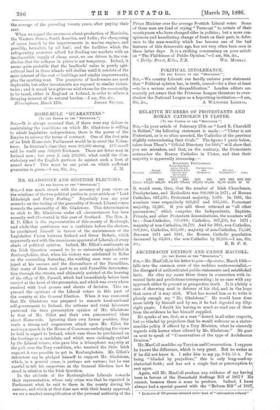MR. GLADSTONE AND SCOTTISH ELECTORS.
[TO THE EDITOR OF THE "SPECTATOR."] SIR, —I was much struck with the accuracy of your views on the relations of the two political parties in your article on " Lord Iddesleigh and Party Feeling." Especially true are your remarks on the feeling of the generality of Scotch Liberal voters towards the personality of Mr. Gladstone. This determination to stick to Mr. Gladstone under all circumstances has been recently well illustrated in this part of Scotland. The Hon. A. R. D. Elliot is the representative of this county of Roxburgh, and while that gentleman was a candidate before the electors, he proclaimed himself in favour of the maintenance of the Legislative Union between Ireland and Great Britain, which apparently met with the unanimous approval of Liberals of every shade of political opinion. Indeed, Mr. Elliot's sentiments on the Irish Question seemed to be so universally applauded in Roxburghshire, that, when his victory was celebrated in Kelso on the succeeding Saturday, the working men were so over- joyed at his success and the discomfiture of the Parnellites, that many of them took part in an anti-Parnellite demonstra- tion through the streets, and ultimately assisted at the burning of the effigy of Mr. Parnell, which had immediately before been carried at the bead of the procession, and which was everywhere received with loud groans and shouts of derision. This ex- pressed the opinions of the Liberal voters in this part of the country at the General Election. When it was rumoured that Mr. Gladstone was prepared to concede local-national self-government to Ireland, the artisans and rural labourers preferred the then presumptive opinion of Mr. Gladstone to that of Mr. Elliot and their own preconceived ideas about Home-rule. Ignoring their own former position, they made a strong and ungenerous attack upon Mr. Elliot for making a speech in the House of Commons embodying the views he held in regard to Ireland, which were those he proclaimed on the hustings as a candidate, and which were strikingly ratified by the Liberal voters, who gave him a triumphant majority at the poll over the Tory candidate, who received the little Irish support it was possible to get in Roxburghshire. Mr. Elliot's detractors say he pledged himself to support Mr. Gladstone, which, in a general sense, is perhaps not untrue ; but he was careful to tell his supporters at the General Election how he stood in relation to the Irish Question.
In the attitude of the Roxburghshire Liberals towards their representative, whose only crime was that he repeated in Parliament what he said to them in the county during his canvass, and which at that time met with their hearty approval, we see a marked exemplification of the personal authority of the Prime Minister over the average Scottish Liberal voter. Some of these men are fond of crying " Turncoat " to certain of their countrymen who have changed sides in politics; but a more con- spicuous and humiliating change of front on their part, in defer- ence to the man-worship which has become one of the bad features of this democratic age, has not very often been seen in these latter days. It is a striking commentary on your article on " The Flabbiness of Public Opinion."—I am, Sir, &c.,


































 Previous page
Previous page